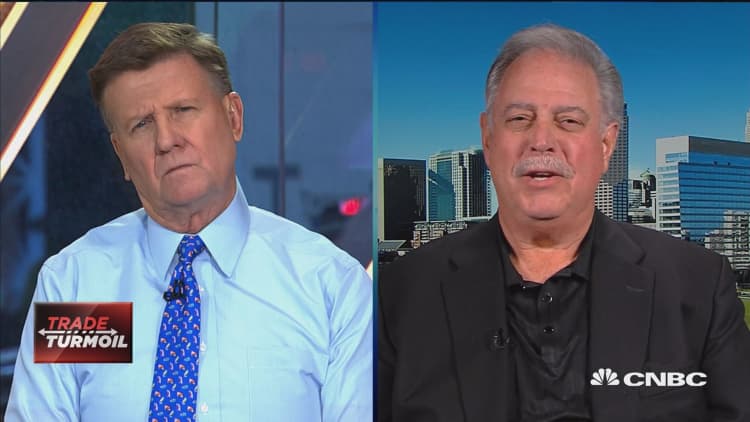TAIPEI, Taiwan — Making good on a campaign promise, President Trump on Thursday announced plans to introduce 25 percent tariffs on imported steel and 10 percent tariffs on aluminum next week.
Speaking at a White House meeting, Trump said that for decades, "disgraceful" trade policies have impacted the steel and aluminum industries. "When our country can't make aluminum and steel," he said, "You almost don't have much of a country."
The announcement jolted markets. Steel stocks jumped on the news, while automakers retracted. The Standard & Poor's 500 Index and Dow Jones Industrial Average remained down on Friday.
But one market that won't be moved much, if at all: Chinese steel.
"A number of Chinese steel mills, transporters, and traders have actually given up on the U.S. market as an export destination," said Shanghai-based Linda Lin, editor of the China Steel Service at consulting firm CRU.
The U.S. is the world's largest steel importer, relying on shipments from more than one hundred countries and territories. Details regarding the tariffs were not presented, and it's unclear if certain trade partners will receive preferential treatment. During the meeting, though, Trump did single out China.
For the Chinese steel manufacturers, however, the news was inconsequential. Although China is the world's largest steel exporter, it is only the 11th-largest source country to the U.S., accounting for just 2 percent of total U.S. imports last year.
Given this low base, "We think this is a negative for the world steel industry as a whole, but as for China, we don't think it can be any worse," Lin said.
Obama administration hit Chinese steel hard in 2016
Prior to this announcement, the U.S. had already implemented trade taxes on different types of imported steel from China. In 2016, the Obama administration imposed duties on some Chinese steel imports by more than 500 percent, causing Chinese imports to the U.S. to drop by almost two-thirds.
According to Yan Tong, Chief Business Development Officer at Shagang International, one of China's largest steel mills, the U.S. has been moving in this direction for years. "Trump's action just accelerated it," she said. "It doesn't affect us that much because we don't export to U.S., anyway."
Trump made the announcement as Liu He, a Chinese economic advisor and reported trusted associate of President Xi Jinping, was visiting the White House.

Although the timing was notable, even if coincidental, the news itself was less so in China.
"It's not very surprising at all. It's in line with market expectations," Lin said.
She said the short-term price of physical steel is not expected to react materially to the news. She cautioned, however, that it could long term, particularly as more information about the tariffs is introduced.
Chinese producers are more directly impacted by domestic supply and demand. With the economy growing 6.9 percent in 2017, steel demand has been stronger than forecast. In particular, Lin noted strong demand from machinery and heavy truck manufacturers.
Additionally, of the 220 export nations and territories welcoming Chinese steel, the U.S. comes in 26th on the list by volume. The top five destinations for Chinese steel are South Korea, Vietnam, the Philippines, Thailand, and Indonesia.
Certainly, Trump's decision may lead to a larger trade war and the tariffs will likely spur retaliatory measures and legal battles at the World Trade Organization (WTO).
At a regularly-scheduled news conference, Chinese Foreign Ministry spokeswoman Hua Chunying was quoted as saying, "The United States is disregarding the rules of the WTO, and China is dissatisfied with this…China will take proper measures to safeguard its legitimate rights and interests."
There's much more Chinese aluminum in U.S.
Aluminum is another matter.
China produces more than half of the world's aluminum, and in 2017, its exports increased 4.5 percent, year-over-year. Last year, U.S. imports hit an all-time high and China is the fourth-largest supplier, trailing only Canada, Russia, and the United Arab Emirates.
Imports from China of aluminum foil, in particular, equalled $389 million in 2016, according to a report from the Department of Commerce in late February, when it announced new anti-dumping measures and duties on Chinese aluminum foil producers.
When introducing the broader tariff plan on Thursday, Trump said, "We're going to build our steel industry back. And we're going to build our aluminum industry back."
Chinese producers are encountering limited direct short-term impacts, but, "We never depend too much on Trump's policy, on USA," Tong said. "It's more about domestic demand and supply. Because if the domestic demand is really good, China would like to export less. The global steel market still very much depends on Chinese prices."
—By Joshua Bateman, special to CNBC.com. Bateman is based in Greater China.
More from Global Investing Hot Spots:
Chinese's Arctic dreams lead to big investment
North Korea's surprising entrepreneurial boom
China is investing heavily in Cambodia





